Bookshelves are rife with stories about the end of the world: There are Biblical, astronomical, environmental apocalypses. Nuclear holocausts. Plagues and famine. Undead masses stirred to violent cannibalism. Aliens! Fascists! Robots!
But what about magic?
My debut novel, Mage Against the Machine, takes place a century after human civilization was mostly destroyed by a group of psychopath wizard industrialists, and as a lover of End Time adventure, I enjoy riding along with all the various sub-genre horsemen of the apocalypse. I’ve found stories about worlds destroyed by magic to be less common than other types of Armageddon, however, so here’s a list of some of the greats…
The Wheel of Time by Robert Jordan
Buy the Book
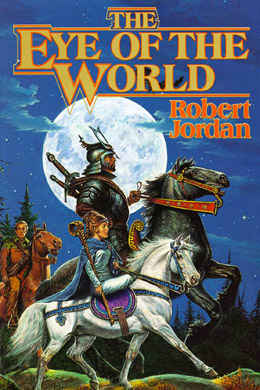

The Eye of the World
I began reading WoT at exactly the right age, in exactly the right circumstances. I was a 12-year-old boy living in a forest. On my desk (a painted door set atop stacked crates full of books and old magazines) was an IBM PC with a VGA graphics card and a towering stack of Wheel of Time hardcovers, all well-worn to various degrees.
Whenever a Wheel of Time novel was released throughout my childhood and into my adulthood, I would reread the entire series, usually starting with Book 2 but occasionally skimming The Eye of the World for the billionth or so time as the details of Jordan’s world gradually became fuzzy.
Even now, after all these years, I still get a thrill at reading the opening line: “The Wheel of Time turns, and Ages come and pass, leaving memories that become legend. Legend fades to myth, and even myth is long forgotten…”
The Dragonlance Chronicles by Margaret Weis and Tracy Hickman
Buy the Book
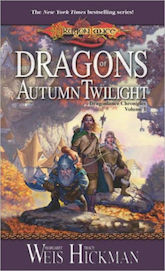

Dragons of Autumn Twilight
The Dragonlance Chronicles are licensed fiction for an old D&D setting – and these books are dope. They take place after the gods abandoned the world, smashing it up with a cataclysm on their way out.
Book 3, Dragons of Spring Dawning, was the first novel to make me cry. I can still remember it, encountering this one particular death as kid and really feeling it in a way I never had with a character dying before.
I’ve yet to actually play the original D&D campaign, but I have a few of the old adventure modules. Reading the novels when I was young, then being able to study these manuals to learn how to retell the stories on my own—it was like opening the hood of a car and taking a peek at the engine!
The Broken Earth Trilogy by N.K. Jemisin
Buy the Book
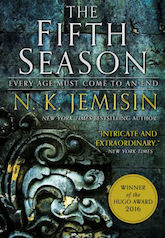

The Fifth Season
As the series title might suggest, the world of The Fifth Season, The Obelisk Gate, and The Stone Sky is one of constant and cyclical destruction, struck by ecological cataclysms every few hundred years. Each and every one of these novels won the Hugo Award for Best Novel.
Every. Single. ONE.
This has never happened before. It probably won’t happen again for a very long time.
Do yourself a favor and go buy the entire trilogy.
The Stormlight Archive series by Brandon Sanderson
Buy the Book
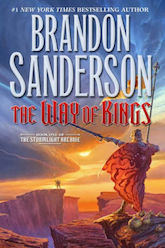

The Way of Kings
When it was announced that Brandon Sanderson would be taking on the responsibility of completing The Wheel of Time following the death of Robert Jordan, I was skeptical…but in the end, he pretty much nailed it. I was impressed, and dove into Sanderson’s other work, curious to see what kind of stories he might tell when not under the terrifying constraints of completing another author’s globally popular magnum opus.
The Way of Kings, the first novel in The Stormlight Archive, introduces us to a world that’s like a perpetually storm-blasted tidal reef. The apocalypse is cyclical here in the setting Sanderson has created. The opening scene shows the final moments of this world’s previous Armageddon, in which a Faustian bargain made by ancient heroes to come back and fight for the world every time the end is neigh is broken. The price—spending the centuries between apocalypses undergoing endless torture in a place that sounds very much like hell—is no longer something the heroes can endure.
And so the next End Time begins, but the reader is shown right at the start that there won’t be any ancient, magical God-Kings to set things right this time around…
The Wraeththu series by Storm Constantine
Buy the Book
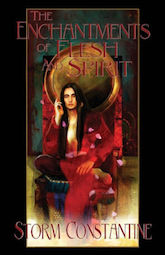

The Enchantments of Flesh and Spirit
Every generation thinks it can glimpse the end of the world. But just like the Death card in the Tarot deck means “change,” not simply “destruction,” great upheavals in civilization usually aren’t the end of it all—just a bloody transition.
The Wraeththu, a new species who evolve and arise as humanity begins to fade, are neither biologically male nor female but hermaphroditic; their sexual intercourse is described in a way that sounds like abstract flower poetry, and relates to their magical abilities. This series is fascinating, beautiful, and wholly unique. It’s a powerful examination of love, sexuality, and death, and it’s filled with complicated, flawed characters caught up in the various conflicts of humanity’s final days, as the Wraeththu slowly claim what’s left of the shattered world for their own.
 Shaun Barger is a Los Angeles-based novelist who detests cold weather, idiot plotting, and fascism. He splits his days between writing, resisting the siren’s call of Hollywood’s eternally mild summer climes, and appeasing a tyrannical three-pound Chihuahua with peanut butter and apple slices. Mage Against the Machine is his first novel.You can find him on Twitter and Instagram @ShaunBarger
Shaun Barger is a Los Angeles-based novelist who detests cold weather, idiot plotting, and fascism. He splits his days between writing, resisting the siren’s call of Hollywood’s eternally mild summer climes, and appeasing a tyrannical three-pound Chihuahua with peanut butter and apple slices. Mage Against the Machine is his first novel.You can find him on Twitter and Instagram @ShaunBarger










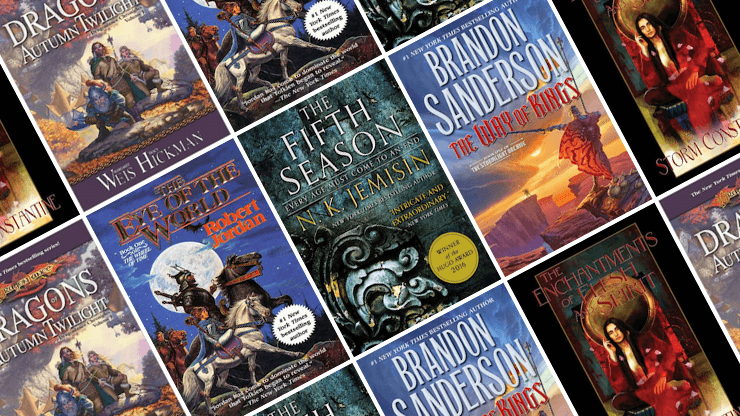
As and Urban Fantasy fan, I would include The Kate Daniels series. Very odd in the fact Magic caused the Apocalypse (magic and tech don’t mix), but now has a tidal flow to it.
SM Stirling’s Island in the Sea of Time is the first title I thought of. Or more accurately, the “Dies The Fire” series that is based on it, when technology stops working due to Magic.
Excellent! Looks like I’ll have to pick up The Way of Kings. I’ve read the rest of these series.
Seconding the emotions while reading scenes from Dragons of Spring Dawning. I was a teenager when those books came out, and had not read anything like them.
And I can whole-heartedly recommend the Broken Earth trilogy. Fantastic books!
Tim Lebbon’s Noreela books (Dusk, Dawn, Fallen and The Island) all take place in a world a few centuries after the Forces of Darkness won pretty decisively. (Well, maybe one of them is a prequel or something? Been a while since I read them.)
Barbara Hambly’s Sun Wolf and Starhawk series is set in a world in which magic going away doesn’t cause a total collapse, but it does seriously shake up the political landscape. Sort of a fall of Rome effect rather than a total fall of civilization.
I’m surprised the Emberverse series from S.M Stirling is not mentioned here, also as i understand it the The Shannara Chronicles was a magical post apocalypse.
Ooh…should have some love for Fred Saberhagen’s Empire of the East, one of the best things I’ve ever read…
Another excellent series is the Sharing Knife books by Lois McMaster Bujold.
Very good list, with few of my very favourite series in it.
Strongly second KAsiki @1 with the Kate Daniels’ series. I had not reached half of the introduction when already wanted to come and add it in the comments. As KAsiki already said, in Kate Daniels’ world, all the magic in the world that had been suppressed for thousands of years came flooding back and did it with a vengeance. Now magic and tech come and go in alternating waves with the other not functioning while the other reigns (the fun exception are the telephones which might or might not work during tech and might or might not work during magic), and with every wave, magic nibbles away the tech-built. People adapt; and while witches and druids might have been active all the time, magic also brings back shapeshifters, ancient gods, and a host of others.
This is the way the Archonate setting by Matt Hughes has been going, as the OS for the universe periodically flips between science and magic with catastrophic results. We see the actual moment in the Kaslo series and the last Henghis Hapthorn story.
I think I know the exact scene in Dragons of Spring Dawning that you’re referring to. I found myself sitting on the couch in my family’s living room, with tears pouring down my face, and my mother standing nearby, interrupting my reading to ask me what was wrong.
The Prince of Thorns trilogy should work for this. But Brandon Sanderson will always be King of fantasy.
Two magic apocalypses, with from opposite ends of the spectrum:
1. The Magic Goes Away, by Larry Niven – the wizards used up all the mana in the world, and the barbarians who relied on brute strength instead of magic will inherit the Earth
2. Ariel, by Steven R. Boyett – our modern world loses its technology and the world of magical creatures reasserts itself.
Patricia McKillip’s Riddle-Master trilogy was almost certainly the earliest post-apocalyptic fantasy I read, although it took me forever to recognize it as such. (Partly because it was fantasy rather than science fiction, I think, and partly because it’s unclear and irrelevant whether it was our world.) I’m also fond of Pamela F. Service’s post-nuclear, gonzo Arthurian Winter of Magic’s Return. While we’re discussing Weis and Hickman, their Death Gate Cycle is post a couple of apocalypses of our world.
Since we´re talking magical post-apocalypses and Margaret Weis/ Tracy Hickman, I think the Death Gate cycle is much more fitting since, y´know… it features an actual magical post apocalypse?
Thanks for highlight Wraeththu. It’s one of my favorites. Let me second Riddle Master of Hed as another favorite of mine. Both of these seem to kind of languish, as they aren’t NEW but they are wonderful, both in world building and magic.
I confess, I read the first book of the “Broken Earth” trilogy and cordially despised it. A great disappointment, as I had loved the author’s Broken Kingdoms.
There’s a level at which just about all fantasy is post-apocalyptic — SOMEBODY had to leave all of those ruins around — but in most cases, it’s been long enough that locals aren’t scrabbling Thundarr-like to eke out a living in the wastelands.
This list is not at all what I was expecting. I was hoping for more books like the Kate Daniels series, post-apocalypse books with magic rather than epic fantasy series that had a big magical catastrophe way back in the day. Really you could throw just about any epic fantasy in there. What was the last battle with Sauron and the Last Alliance but a magical catastrophe that sets up the Lord of the Rings?
The world of Melanie Rawn’s “Exiles” series (although tragically not complete) is built very solidly on the foundation of a world that was destroyed by magic, with birth defects caused by magical pollution forming the basis of the entire social order and magicians kept tightly in check by the government in order to avoid a repeat. The first book is among my favorite novels ever.
Before all these there was Jack Vance’s “Tales of the Dying Earth” — I just finished reading the omnibus for the first time. Influential in ways I never knew!
Gladstone’s Craft series qualifies.
I, too, started the wheel of time at about the age of twelve, and reread the entire series when a new novel came out. When I started it, I believe books 1-3 were out. I think it’s time I revisit my old friends in Randland. :)
Several I will need to read – both in the article and in the comments. Love having book recommendations!
And the “end is neigh” misspelling is a great set up for an apocalyptic four horsemen pun.
YAY someone else showing some love for the Wraeththu series!!! How you feel about WoT is how I feel about them – in fact I had a portrait of Pell (from the gorgeous UK painted covers) tattooed on my shoulderblade.
Its a tragically underrated and under read series so love to see a shout out here :)
Sean Stewart’s “Resurrection Man” and sequels (“Galveston”, etc) ?
Mercedes Lackey’s Valdemar series is actually post-magical-apocalypse. And then it’s “oh by the way the apocalypse is returning”. (That was ’94 so I imagine things have progressed since then.)
Feist’s Magician books are pre-and-during-Apocalypse, as I recall.
Both Elantris & the Mistborn trilogy by Sanderson deal with the catastrophic effects of magic gone awry as well . . . .
@13: I also loved “Ariel” and its sequel “Elegy Beach”. Superb books written (and set) about 20 years apart.
There’s also Mercedes Lackey’s “Hunter” trilogy. It’s set on a future earth after an apocalypse of combined technological and magical origin.
I too continue to reread the WOT. I reread it every time a new volume came out. I met Robert Jordan, got one of my volumes autographed. Was very sad when he passed away for many reasons. I started reading the series with vol. 1 and had no idea it was a series til the end. No other characters have gripped me like those of WOT. I haven’t found anything to match it in all of my reading. Started reading series as a 30ish woman.
Goose Creek, SC
Both Games Workshop backgrounds qualify for this trope, one more obviously than the other.
The straight Fantasy one (just “Warhammer”), was originally set after a “minor” apocalypse, which destroyed an entire race and their civilisation, and left the poles uninhabitable wastelands. Recently, in one of their summer events, the bad guys won and literally destroyed the world. The game is now set in what amounts to the Afterlife. It’s gone a bit weird.
In the Science Fantasy setting (Warhammer 40,000), two magical apocalyptic events occur. It’s not clear how the two are related. The first is the Eldar (space elves) using magic to indulge their increasingly decadent lifestyles resulted in the creation of an amoral god that consumed most of their race (and this their civilisation) during its “birth”, and seeks to consume the souls of the remaining handful of survivors. The second event (really a series of closely linked events) is called the Horus Heresy. One of the major characters is tempted into a Faustian pact for magical and temporal power. The resulting Civil War practically destroys the civilisation for all intents and purposes. One of the consequences of the conflict is that demonic possession (from reasons not yet made clear) becomes extremely easy. Pre-Heresy, psychic and magical research is carried out throughout human space with apparently no reason to fear the consequences. Post-Heresy, the slightest trace of psychic power acts as a beacon for amoral, non-corporeal predators. Unusually lucky people are lynched on the off-chance they might act as a gateway for demons to manifest and slaughter the population. If you actually are psychic, your best fate is to be enslaved and indoctrinated to be a defender of the Gormanghast-like reminants of human civilisation.
Did I mention how grim and dark, dark and grim both backgrounds are?